Heat Pump Water Heater Market
Heat Pump Water Heater Market Size and Share Forecast Outlook 2025 to 2035
Heat pump water heater market is projected to grow from USD 5.0 billion in 2025 to USD 11.2 billion by 2035, at a CAGR of 8.4%. Air-source will dominate with a 74.0% market share, while 50-80 gal will lead the capacity segment with a 48.0% share.
Heat Pump Water Heater Market Forecast and Outlook 2025 to 2035
The global heat pump water heater market is valued at USD 5.0 billion in 2025. The market is slated to reach USD 11.2 billion by 2035. This records an absolute increase of USD 6.2 billion over the forecast period. The total growth amounts to 124.0%. The market forecast shows expansion at a compound annual growth rate (CAGR) of 8.4% between 2025 and 2035. The overall market size is expected to grow by approximately 2.24X during the same period.
Growth is supported by increasing demand for energy-efficient heating solutions. Growing adoption of sustainable water heating systems drives expansion. Rising preference for environmentally friendly technology across residential applications supports market development. Commercial applications show increased efficiency system adoption.
Quick Stats for Heat Pump Water Heater Market
- Heat Pump Water Heater Market Value (2025): USD 5.0 billion
- Heat Pump Water Heater Market Forecast Value (2035): USD 11.2 billion
- Heat Pump Water Heater Market Forecast CAGR: 8.4%
- Leading Product in Heat Pump Water Heater Market: Air-source (74.0%)
- Key Growth Regions in Heat Pump Water Heater Market: North America, Europe, and Asia-Pacific
- Key Players in Heat Pump Water Heater Market: A. O. Smith, Rheem, Daikin, Panasonic, Midea, Bosch Thermotechnology, Viessmann, NIBE, Gree, Haier
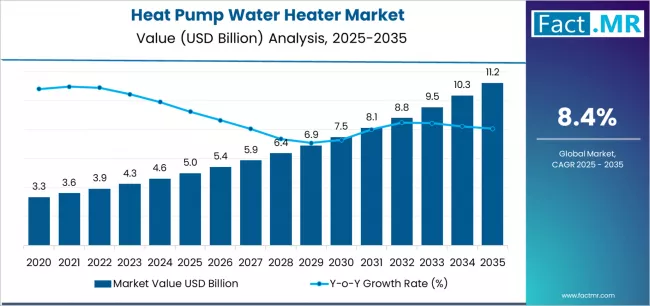
The heat pump water heater market represents a specialized segment of the global water heating equipment industry. The market shows rapid technological advancement. Consistent demand exists across residential energy efficiency channels. Commercial heating channels drive growth. Market dynamics are influenced by changing consumer requirements toward energy-efficient water heating. Growing interest in environmental sustainability management shapes development. Expanding partnerships between heating equipment manufacturers drive growth. Homeowners in developed economies show increased adoption. Emerging economies demonstrate growing demand patterns. Traditional water heating methods continue evolving. Consumers seek proven energy-saving alternatives. Enhanced efficiency benefits attract residential users. Reliable performance characteristics remain essential requirements.
Consumer behavior in the heat pump water heater market reflects broader home automation trends. Efficient heating systems provide functional benefits. Effective systems deliver cost savings. The market benefits from growing popularity of advanced water heating systems. These systems are recognized for sophisticated energy management integration. Technical approach to water heating gains acceptance. The versatility of heat pump water heaters supports multiple applications. Standalone heating devices serve specific needs. Integrated home energy system components expand market reach. Multiple residential applications drive demand growth. Commercial segments show increased adoption patterns.
Regional adoption patterns vary significantly across global markets. North American markets show strong preference for standardized heat pump water heater implementations. European markets demonstrate similar standardization trends. Asian markets show increasing adoption of advanced heating solutions. Conventional water heating systems remain popular in developing regions. The residential landscape continues evolving with sophisticated products. Quality-controlled heat pump water heater products gain traction in mainstream applications. Residential applications reflect homeowner willingness to invest in improvements. Proven heating system enhancements attract investment. Performance-oriented features drive adoption decisions.
The competitive environment features established heating equipment companies. Specialized heat pump solution providers focus on unique capabilities. Advanced heating methods drive differentiation. Manufacturing efficiency remains critical for market participants. Product development optimization continues as key factor. Raw material costs create ongoing challenges. Quality standardization requirements fluctuate regularly. Distribution strategies emphasize multi-channel approaches. Traditional residential supply chains combine with direct partnerships. Technical service platforms expand market reach. Supply distribution agreements strengthen customer relationships.
Market consolidation trends indicate acquisition strategies by larger manufacturers. Heating equipment manufacturers acquire specialized heat pump companies. Product portfolio diversification drives acquisition activity. Access to specialized heating system segments motivates purchases. Private label development has gained momentum. Residential companies seek differentiation opportunities. Competitive pricing structures remain important considerations.
Specialized heat pump water heater variants emerge in the market. High-efficiency options reflect changing consumer priorities. Smart-enabled options create new market opportunities. Innovative heating system developers benefit from emerging trends. Manufacturing automation enables consistent production scaling. Quality control improvements maintain traditional performance characteristics. Consumers expect established performance from heating system brands.
Between 2025 and 2030, the heat pump water heater market projects expansion from USD 5.0 billion to USD 8.1 billion. This results in a value increase of USD 3.1 billion. The increase represents 50.0% of the total forecast growth for the decade. This development phase will be shaped by increasing adoption of standardized heating systems. Rising demand for energy-efficient solutions drives growth.
Certified solutions gain market acceptance. Growing emphasis on environmental benefits features supports expansion. Enhanced efficiency characteristics attract users. Residential manufacturers expand automation capabilities. Growing demand for specialized heat pump water heater implementations continues. Advanced heating options gain popularity. Private label offerings across residential segments increase.
Heat Pump Water Heater Market Key Takeaways
| Metric | Value |
|---|---|
| Estimated Value (2025E) | USD 5.0 billion |
| Forecast Value (2035F) | USD 11.2 billion |
| Forecast CAGR (2025-2035) | 8.40% |
From 2030 to 2035, the market is forecast to grow from USD 8.1 billion to USD 11.2 billion. This adds another USD 3.1 billion. The addition constitutes 50.0% of the overall ten-year expansion. This period is expected to be characterized by expansion of high-performance systems. Integration of innovative heating solutions continues.
Development of specialized heat pump water heater implementations occurs. Enhanced efficiency profiles gain importance. Extended performance capabilities attract users. Growing adoption of advanced automation will drive demand. Heat pump water heaters with superior heating characteristics gains acceptance. Compatibility with advanced home technologies across residential operations expands.
Between 2020 and 2025, the heat pump water heater market experienced rapid growth. Increasing demand for energy-efficient solutions drove development. Growing recognition of heating systems as essential components supported expansion. Modern home energy programs across residential applications gained momentum.
Commercial applications showed growth. The market developed as homeowners recognized potential benefits. Heat pump water heater solutions provide functional advantages. Energy savings benefits enable convenient heating protocols. Technological advancement in automation systems began development. Energy-critical applications emphasize importance of maintaining performance. Consistency in diverse residential environments becomes critical.
Why is the Heat Pump Water Heater Market Growing?
Market expansion is supported by increasing global demand for energy-efficient heating solutions. Corresponding need for heating systems provides superior environmental benefits. Energy advantages enable enhanced cost outcomes. Extended compatibility across various residential applications drives growth. Commercial applications show expansion. Modern homeowners focus on implementing proven heating devices.
Energy specialists seek effective efficiency support. Minimized energy consumption appeals to users. Consistent performance throughout complex residential configurations attracts adoption. Diverse residential environments require reliable solutions. Heat pump water heaters deliver exceptional heating efficacy against traditional alternatives. Advanced automation integration capabilities support modern protocols. Essential components for contemporary residential operations gain acceptance.
Growing emphasis on environmental sustainability drives demand for heating technology adoption. Heat pump water heaters support large-scale residential requirements. Improved cost outcomes attract users. Advanced heating systems gain acceptance. Consumer preference for products combines effective heating support with proven performance. Environmental benefits create opportunities for innovative implementations.
Rising influence of green energy trends contributes to increased demand. Sustainability awareness drives market growth. Heat pump water heaters provide advanced reliability. Seamless automation integration appeals to users. Consistent performance across extended operation periods remains important.
Opportunity Pathways - Heat Pump Water Heater Market
The heat pump water heater market shows potential for rapid growth. Technological advancement continues development. Homeowners across North America seek components delivering exceptional heating quality. Europe shows similar trends.
Asia-Pacific markets demonstrate growth potential. Emerging markets seek advanced efficiency capabilities. Reliable performance options gain acceptance. Heat pump water heater solutions gain prominence beyond heating devices. Strategic enablers of home automation expand applications. Advanced efficiency functionality grows in importance.
Rising home automation adoption in Asia-Pacific amplifies demand. Expanding environmental initiatives globally support growth. Manufacturers leverage innovations in heating engineering. Advanced automation integration gains momentum. Energy management technologies advance rapidly.
Pathways like high-performance implementations show promise for strong margin uplift. Specialized heating platforms demonstrate potential. Advanced efficiency solutions target premium residential segments. Geographic expansion captures volume opportunities. Product diversification addresses market needs.
Local residential preferences become critical factors. Advanced efficiency adoption drives regional growth. Regulatory support around energy efficiency certification provides structural foundation. Heating efficacy standards gain importance. Environmental protocols strengthen market development.
- Pathway A - High-Performance Implementations. Residential users require heat pump water heater solutions with high-performance capabilities. Large homes demand advanced efficiency profiles for enhanced heating appeal. Premium positioning capabilities attract investment. Heating system developers creating high-performance platforms with superior efficiency standards command premium pricing. Expected revenue pool: USD 2.24 billion to USD 2.8 billion.
- Pathway B - Specialized Heating Platforms. Growing demand for specialized heating implementations drives market growth. Advanced efficiency capabilities attract users. Unique energy features create demand for advanced automation capabilities. Specialized residential integration opportunities exist. Revenue opportunity: USD 1.96 billion to USD 2.45 billion.
- Pathway C - Advanced Efficiency Solutions. Advanced heat pump water heater formulations meet specific residential requirements. Energy compatibility requirements grow. Specialized efficiency profiles enable market expansion. Enhanced homeowner appeal attracts efficiency-focused manufacturers. Revenue lift: USD 1.68 billion to USD 2.1 billion.
- Pathway D - Commercial Applications. Expanding reach into commercial heating platforms creates opportunities. Optimized heating delivery gains importance. Advanced commercial integration capabilities expand. Extended performance capabilities attract users. Manufacturers seek partners supplying integrated solutions with complete heating functionality. Pool: USD 1.8 billion to USD 2.25 billion.
- Pathway E - Geographic Expansion & Local Manufacturing. Strong growth in APAC markets continues. China shows particular potential. India demonstrates expansion opportunities. Southeast Asia markets develop rapidly. Local manufacturing lowers costs. Supply complexity reduction enables faster response to regional preferences. Expected upside: USD 1.9 billion to USD 2.38 billion.
- Pathway F - Private Label Development. Increasing demand for custom formulations grows. Brand-specific functionality gains importance. Specialized heating profiles with validated performance characteristics attract residential companies. Revenue opportunity: USD 1.4 billion to USD 1.75 billion.
- Pathway G - Digital Integration. Developing comprehensive automation solutions creates differentiation. Digital platform compatibility services expand applications. Heating programs address specialized requirements for residential operators. Home automation companies show growing demand from digital heating services. Pool: USD 1.26 billion to USD 1.58 billion.
Segmental Analysis
The market is segmented by product, capacity, end-use sector, and region. By product, the market divides into Air-source, Hybrid, and Geothermal categories. By capacity, it covers 50-80 gal, <50 gal, and >80 gal segments. By end-use sector, it includes Residential and Commercial categories. Regionally, the market spans North America, Europe, Asia-Pacific, Latin America, and Middle East & Africa.
By Product, the Air-source Segment Accounts for 74.0% Market Share
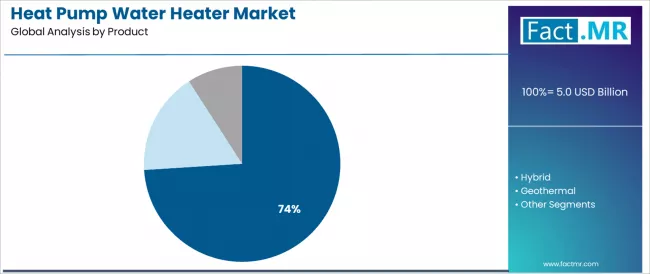
The air-source segment projects to account for 74.0% of the heat pump water heater market in 2025. This reaffirms its position as the leading product category. Homeowners utilize air-source implementations for superior heating standards. Energy system integrators prefer these systems when operating across diverse residential platforms. Excellent efficiency properties attract users. Widespread acceptance ranges from basic heating operations to critical residential processing. Air-source technology's advanced heating methods address homeowner requirements for efficient heating solutions. Complex residential environments benefit from these capabilities.
This product segment forms the foundation of modern residential adoption patterns. The implementation offers greatest operational efficiency. Established market demand exists across multiple residential categories. Home energy segments show strong adoption. Homeowner investments in air-source standardization continue. Heating efficiency improvements strengthen adoption among residential users. Energy companies prioritize efficiency with operational reliability. Air-source implementations align with functionality preferences. Performance expectations make these systems central components of comprehensive home energy strategies.
By Capacity, the 50-80 gal Segment Accounts for 48.0% Market Share
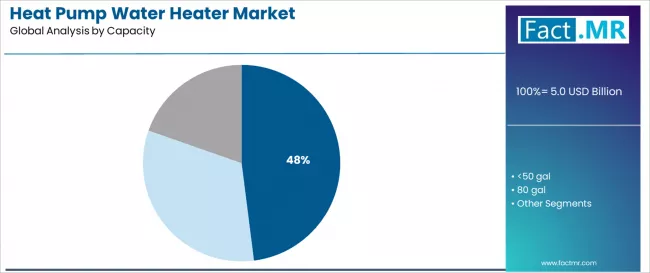
The 50-80 gallon capacity applications project to represent 48.0% of heat pump water heater demand in 2025. This underscores their critical role as primary capacity range for heating devices. Residential operations use these systems across water heating applications. Home operations benefit from heating capabilities. Residential applications show strong adoption. Homeowners prefer this capacity range for exceptional versatility characteristics. Scalable heating options appeal to users. Ability to handle diverse household demands while ensuring consistent heating performance attracts adoption. Various residential platforms benefit from heating methods. Essential capacity range for modern home operations offers functional advantages. Efficiency benefits remain important considerations.
The segment gains support from continuous innovation in water heating technologies. Growing availability of specialized implementations enables diverse residential requirements. Enhanced heating uniformity capabilities expand applications. Extended efficiency capabilities attract investment. Homeowners invest in advanced heating systems supporting large-scale residential integration. Home development drives growth. Residential automation trends become prevalent. Homeowner efficiency awareness increases acceptance. Mid-range capacity applications continue representing major implementation markets. Advanced residential utilization strategies gain support. Heating integration initiatives expand market reach.
By End-Use Sector, the Residential Segment Accounts for 68.0% Market Share
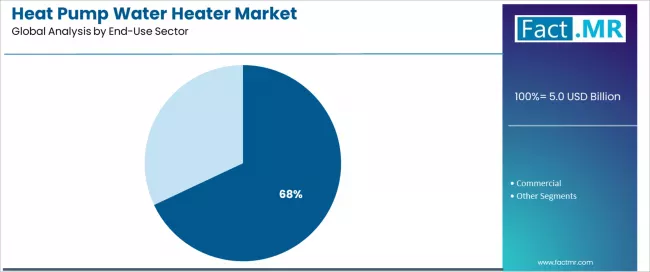
Residential applications project to represent 68.0% of heat pump water heater demand in 2025. This demonstrates significance as primary deployment sector for heating systems. Home operations benefit from efficiency advantages. Residential facilities show strong adoption. Homeowners utilize heat pump water heaters for exceptional energy characteristics. Proven reliability in residential environments attracts users. Ability to maintain consistent heating performance across diverse home conditions appeals to homeowners. The segment's dominance reflects critical nature of efficient heating in residential operations. Homeowner commitment to energy efficiency standards drives adoption.
The residential sector drives innovation in heating technology through demanding home requirements. Stringent efficiency regulations exist. Homeowners invest heavily in advanced heating systems ensuring operational continuity. Energy compliance requirements grow. Increasing emphasis on home efficiency supports market position. Environmental management initiatives expand. Residential applications maintain position as largest end-use segment. Technological advancement initiatives continue. Performance optimization across heat pump water heater markets gains momentum.
What are the Drivers, Restraints, and Key Trends of the Heat Pump Water Heater Market?
The heat pump water heater market advances rapidly due to increasing demand for energy-efficient heating solutions. Growing adoption of heating systems provides superior efficiency characteristics. Environmental benefits enable enhanced cost outcomes across diverse residential applications. Commercial applications expand market reach.
The market faces challenges including complex regulatory requirements. Evolving efficiency standards create compliance needs. Specialized heating expertise requirements grow. Energy programs become more sophisticated. Innovation in heating engineering continues influencing product development. Advanced heating systems drive market expansion patterns.
Expansion of Home Energy Technologies and Heating Solution Integration
Growing adoption of heating solutions enables market development. Advanced energy management capabilities expand applications. Home automation awareness drives equipment manufacturers to produce advanced heat pump water heater solutions. Superior efficiency positioning attracts users. Enhanced reliability profiles gain acceptance. Seamless integration functionalities expand market reach.
Advanced heating systems provide improved operational outcomes. More efficient home workflows develop. Reliable performance across various residential applications continues. Home conditions improve with advanced systems. Developers recognize competitive advantages of heating solution integration capabilities. Market differentiation opportunities expand. Efficiency positioning becomes increasingly important.
Integration of Advanced Heating Methods and Energy Engineering
Modern heat pump water heater providers incorporate advanced heating technology. Energy system integration expands capabilities. Sophisticated heating solutions enhance product appeal. Intelligent heating features develop rapidly. Value-added solutions for residential customers gain acceptance.
These technologies improve home efficiency. New market opportunities emerge including standardized performance. Optimized energy enhancement capabilities expand. Enhanced reliability characteristics attract users. Advanced energy integration allows developers supporting comprehensive residential technologies. Market expansion beyond traditional heating approaches continues.
Analysis of the Heat Pump Water Heater Market by Key Countries
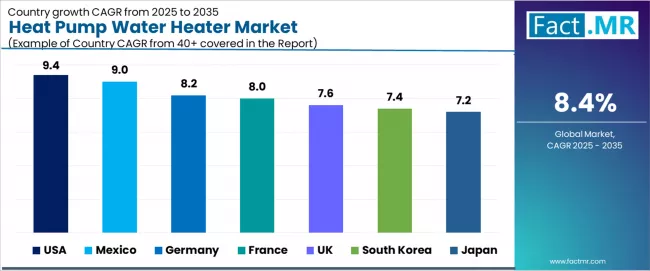
| Country | CAGR (2025-2035) |
|---|---|
| USA | 9.4% |
| Mexico | 9.0% |
| Germany | 8.2% |
| France | 8.0% |
| South Korea | 7.4% |
| UK | 7.6% |
| Japan | 7.2% |
The heat pump water heater market experiences exceptional growth globally. The United States leads at 9.4% CAGR through 2035. Expanding residential construction drives growth. Growing energy efficiency programs support development. Significant investment in sustainable heating advancement continues. Mexico follows at 9.0%. Increasing residential expansion supports growth. Growing modernization patterns develop. Expanding energy infrastructure drives demand.
Germany shows growth at 8.2%. Engineering leadership emphasizes development. Heating technology advancement continues. France records 8.0% growth. Expanding residential capabilities support market development. Energy system integration modernization continues. The UK demonstrates 7.6% growth. Advanced heating technology development occurs.
Energy efficiency adoption trends drive market expansion. South Korea exhibits 7.4% growth. Heating technology innovation emphasizes development. Residential advancement continues. Japan shows 7.2% growth. Quality control initiatives support development. Technology-focused production patterns continue.
The report covers in-depth analysis of 40+ countries. Seven top-performing countries receive highlighting below.
USA Leads Global Market Growth with Residential Energy Dominance
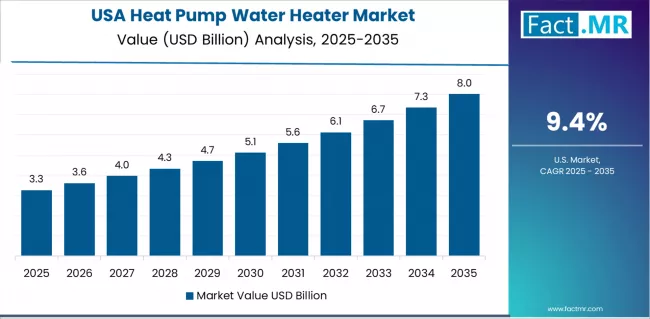
Revenue from heat pump water heaters in USA projects exceptional growth with 9.4% CAGR through 2035. Expanding residential capacity drives development. Rapidly growing energy efficiency integration receives government initiative support promoting sustainable heating development.
The country's strong position in energy technology supports growth. Increasing investment in heating infrastructure creates substantial demand for advanced implementations. Major residential builders establish comprehensive energy capabilities. Heating system companies serve domestic residential demand. Expanding green building markets drive growth.
The US leads global market growth due to its massive residential market and strong government support for energy efficiency. The country benefits from federal tax credits and rebates for heat pump water heaters. Major factors include state-level renewable energy mandates driving adoption.
California's Title 24 energy code requires high-efficiency water heating. Federal Inflation Reduction Act provides significant consumer rebates. Strong utility company rebate programs encourage adoption. Growing focus on decarbonization in residential sector. Advanced building codes requiring energy-efficient appliances. Large new construction market creates installation opportunities.
Government support for energy efficiency modernization initiatives drives demand for advanced heating systems. Major residential regions benefit from development. Home construction centers across the country show expansion. Strong energy technology growth occurs. Expanding network of efficiency-focused builders supports rapid adoption. Residential operators seek advanced heating capabilities. Integrated energy technologies gain acceptance.
Mexico Demonstrates Strong Residential Growth with Energy Expansion
Revenue from heat pump water heaters in Mexico expands at 9.0% CAGR. The country's growing residential sector supports development. Expanding energy capacity drives growth. Increasing adoption of heating technologies continues. Country initiatives promoting energy modernization create demand. Growing energy efficiency awareness drives requirements for quality-controlled heating systems. International residential providers establish extensive capabilities. Domestic energy companies address growing demand for advanced heating solutions.
Mexico shows strong growth potential driven by expanding middle class and government energy efficiency programs. The country experiences rapid residential construction growth supported by demographic trends. Key factors include growing urbanization requiring modern appliances. Rising electricity costs making heat pump water heaters attractive. Government programs promoting energy-efficient appliances. Growing environmental awareness among consumers. Increasing availability of financing for efficient appliances. Rising disposable income enabling premium purchases. Hot climate reducing heating efficiency concerns. Strong tourism sector driving hotel construction with efficiency requirements.
Rising residential requirements create opportunities for heat pump water heater adoption. Metropolitan construction centers show growth. Progressive builders invest in modern energy facilities. Major residential regions expand operations. Growing focus on energy efficiency integration drives adoption. Heating features appeal to builders seeking enhanced operational capabilities. Advanced efficiency delivery experiences attract investment.
Germany Demonstrates Engineering Leadership with Heating Technology Growth
Revenue from heat pump water heaters in Germany expands at 8.2% CAGR. The country's engineering heritage supports development. Strong emphasis on heating technology continues. Robust demand for advanced heating systems exists in residential applications. Energy applications drive growth. The nation's mature residential sector supports development. Technology-focused operations drive sophisticated implementations throughout the energy industry. Leading manufacturers invest extensively in technology development. Advanced heating methods serve domestic markets. International markets benefit from German expertise.
Germany maintains its position as Europe's renewable energy leader with strong environmental policies. The country's Energiewende (energy transition) drives heat pump adoption. Growth drivers include ambitious climate targets requiring residential decarbonization. Strong government subsidies for heat pump installations. Excellent financing programs through KfW development bank. High electricity grid renewable energy content improving heat pump environmental benefits. Strong engineering culture supporting advanced technology adoption. High energy costs making efficient systems attractive. Stringent building energy codes requiring efficient heating. Well-established heat pump installer network. Cold climate technology development making air-source heat pumps viable.
Rising demand for high-performance heating technologies creates requirements for sophisticated solutions. Exceptional heating capabilities appeal to quality-conscious builders. Enhanced residential experiences gain acceptance. Advanced heating methods attract investment. Strong engineering tradition supports growth. Growing investment in heating technologies drives adoption. Quality platforms with advanced development methods appeal to users. Enhanced heating profiles across residential operations expand in major construction regions.
France Focuses on Residential Modernization and Heating Integration
Revenue from heat pump water heaters in France grows at 8.0% CAGR. The country's residential modernization sector drives development. Growing heating integration programs support expansion. Increasing investment in energy development continues. France's residential infrastructure supports market growth. Commitment to technological advancement drives demand for diverse heating solutions. Multiple residential segments benefit from development. Builders establish comprehensive heating capabilities. Growing domestic market drives development. Expanding residential opportunities support growth.
France demonstrates strong growth supported by aggressive climate policies and residential renovation programs. Key factors include RE2020 building regulations favoring heat pumps. Strong government renovation subsidies through MaPrimeRénov program. Carbon tax making fossil fuel heating expensive. Nuclear electricity advantage reducing heat pump operating costs. Strong focus on energy independence reducing gas heating reliance. Growing environmental consciousness among consumers. Excellent installer training programs ensuring quality installations. High existing building stock requiring heating system upgrades. Strong construction industry supporting new installations. Well-developed electrical grid supporting heat pump installations.
Strong residential expansion drives adoption of integrated heating systems. Superior heating capabilities appeal to users. Advanced integration attracts large residential builders. Progressive construction companies invest in systems. Growing heating diversity supports market expansion. Increasing residential adoption drives advanced implementations. Seamless heating profiles appeal to users. Modern heating delivery throughout the country's residential regions gains acceptance.
The UK Emphasizes Advanced Technology Development and Energy Efficiency Trends
Revenue from heat pump water heaters in the United Kingdom expands at 7.6% CAGR. The country's advanced heating technology sector supports development. Strategic focus on energy solutions continues. Established residential capabilities drive growth. The UK's heating system innovation leadership supports market expansion.
Energy technology integration drives demand for specialized implementations in residential applications. Commercial operations show growth. Advanced efficiency products expand market reach. Operators invest in comprehensive heating development serving domestic specialty markets. International quality applications benefit from development.
The UK shows strong growth driven by net-zero commitments and gas heating phase-out plans. Government ban on gas boilers in new homes from 2025 creates demand. Key factors include Green Homes Grant and subsequent funding schemes. Strong focus on heat pump deployment to meet climate targets. Boiler Upgrade Scheme providing £5,000 grants for heat pumps. Growing heat pump installer training programs.
High gas prices making heat pumps cost competitive. Strong renewable electricity growth improving heat pump environmental credentials. Government Heat and Buildings Strategy prioritizing heat pumps. Growing consumer awareness of climate benefits. Well-developed electrical infrastructure supporting installations.
Energy optimization and heating technology advancement create opportunities for specialized heating adoption in advanced systems. Residential services benefit from development. Technology-focused energy operations among leading residential enterprises gain acceptance. Growing emphasis on advanced heating delivery drives adoption. Heating features support quality implementations with enhanced technology profiles. Integrated heating management throughout the country's residential technology sector expands market reach.
South Korea Exhibits Heating Technology Development and Residential Growth
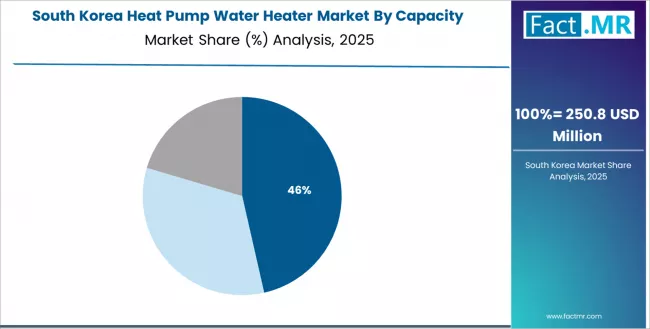
Revenue from heat pump water heaters in South Korea grows at 7.4% CAGR. The country focuses on heating technology advancement. Emphasis on residential innovation continues. Strong position in energy development supports growth. South Korea's established residential capabilities drive market expansion.
Commitment to technology diversification supports investment in specialized heating technologies throughout major residential regions. Industry leaders establish comprehensive technology integration systems serving domestic residential operations. Advanced heating applications benefit from development.
South Korea exhibits strong growth driven by government green new deal and residential modernization programs. Key drivers include Korean New Deal emphasizing green technology adoption. Strong domestic heat pump manufacturing capabilities from companies like LG and Samsung. Government subsidies for high-efficiency appliances.
Growing environmental awareness and air quality concerns. High apartment living requiring efficient water heating solutions. Strong technology adoption culture among consumers. Rising energy costs making efficient systems attractive. Cold climate driving advanced air-source heat pump development. Government building energy efficiency standards. Strong electrical grid supporting heat pump operations.
Innovations in heating platforms create demand for advanced implementations with exceptional heating properties among progressive residential operators. Enhanced technology differentiation gains acceptance. Operational appeal drives adoption. Growing residential adoption supports market development.
Increasing focus on heating innovation drives advanced platform adoption. Integrated heating delivery gains acceptance. Residential optimization across construction enterprises throughout the country expands market reach.
Japan Shows Quality Control Focus and Technology-Driven Production
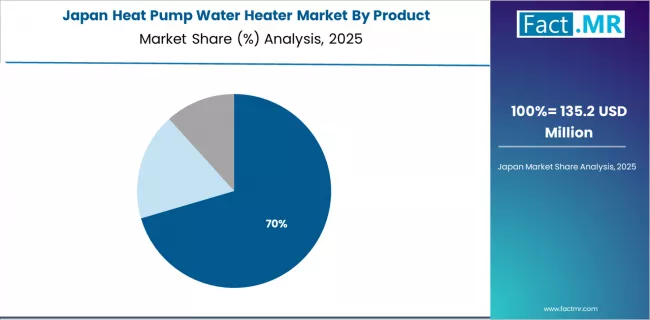
Revenue from heat pump water heaters in Japan expands at 7.2% CAGR. The country's heating system excellence initiatives support development. Growing heating technology sector continues expansion. Strategic emphasis on advanced residential development drives market growth.
Japan's advanced quality control capabilities support demand. Integrated heating systems drive demand for high-quality platforms in residential operations. Energy applications grow. Advanced technology applications expand market reach. Leading manufacturers invest in specialized capabilities serving technology-focused residential requirements. Energy industries demand sophisticated solutions.
Japan shows steady growth supported by energy security concerns and advanced technology development. Growth factors include post-Fukushima focus on energy efficiency and renewable energy. Strong domestic manufacturing from companies like Panasonic and Daikin. Government Top Runner program setting efficiency standards. High electricity costs driving adoption of efficient heating.
Advanced heat pump technology development including CO2 refrigerant systems. Strong focus on product quality and reliability. Compact housing requiring space-efficient water heating solutions. Aging population preferring low-maintenance heating systems. Government subsidies for high-efficiency equipment. Strong installer network ensuring quality installations. Advanced smart grid integration capabilities.
Quality control advancement creates requirements for specialized solutions with superior quality integration. Exceptional heating capabilities attract investment. Advanced efficiency features gain acceptance among quality-conscious residential operations. Residential operators seek sophisticated systems. Strong position in heating technology innovation supports adoption of advanced systems with validated heating characteristics. Quality integration capabilities throughout the country's residential technology sector expand.
Europe Market Split by Country
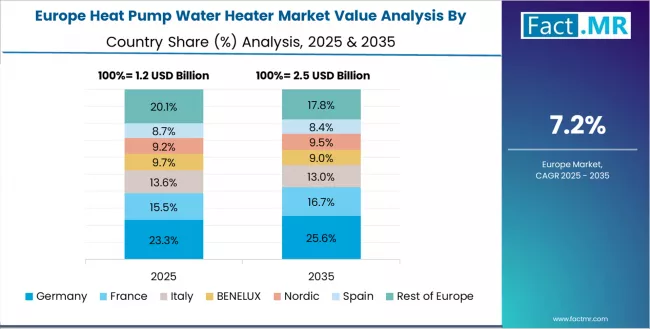
The heat pump water heater market in Europe projects growth from USD 1.5 billion in 2025 to USD 3.36 billion by 2035. This registers CAGR of 8.4% over the forecast period. Germany expects to maintain leadership position with 32.0% market share in 2025. This declines slightly to 31.7% by 2035. Support comes from strong engineering culture. Sophisticated heating manufacturing capabilities continue. Comprehensive residential sector serves diverse applications across Europe.
France follows with 28.0% share in 2025. This projects to reach 28.3% by 2035. Robust demand for advanced heating technologies in residential applications drives growth. Energy modernization programs support development. Heating markets benefit from established residential infrastructure. Technology integration expertise continues. The United Kingdom holds 18.7% share in 2025. This expects to reach 19.0% by 2035. Strong heating technology sector supports growth. Growing energy efficiency activities drive development. Italy commands 12.0% share in 2025. This projects to reach 12.2% by 2035.
Spain accounts for 7.3% in 2025. This expects to reach 7.4% by 2035. Rest of Europe region anticipates maintaining momentum. Collective share moves from 2.0% to 1.4% by 2035. Increasing heating modernization in Eastern Europe drives development. Growing technology penetration in Nordic countries implementing advanced energy programs supports expansion.
Competitive Landscape of the Heat Pump Water Heater Market
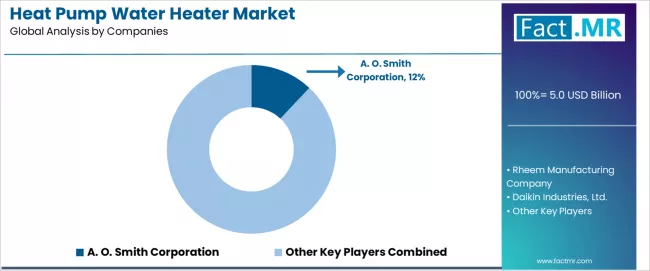
The heat pump water heater market demonstrates intense competition among established heating equipment manufacturers, specialized heat pump developers, and integrated residential energy solution providers. Companies invest heavily in heating technology research, energy efficiency optimization, and advanced heat pump system development to deliver consistent, high-performance, and application-specific heat pump water heater solutions. Innovation in advanced energy integration, efficiency enhancement, and smart home compatibility improvement remains central to strengthening market position and competitive advantage across global markets.
A. O. Smith leads the market with a substantial 12.0% market share, offering comprehensive heating solutions including quality energy platforms and advanced heat pump water heater systems with particular focus on residential and commercial applications. The company's strength lies in water heating technology innovation, providing integrated solutions that combine traditional and heat pump technologies.
Rheem provides specialized heating capabilities with strong emphasis on advanced heat pump water heater implementations and innovative energy-efficient solutions, particularly serving residential and light commercial markets. Daikin delivers comprehensive residential services with focus on integrated HVAC platforms and large-scale residential applications, combining air conditioning and water heating technologies.
Panasonic specializes in advanced heat pump devices and energy-efficient implementations for residential applications, expanding market reach through comprehensive home energy solutions. Midea focuses on premium heating integration and innovative technology solutions for global residential markets.
Bosch Thermotechnology offers advanced heating platforms with emphasis on high-efficiency and renewable energy applications, serving both residential and commercial sectors. The competitive environment also includes significant players like Viessmann, NIBE, Gree, and Haier, each focusing on specific market segments and technological specializations in heat pump and energy-efficient heating solutions.
The competitive landscape reflects ongoing consolidation as larger HVAC companies acquire specialized heat pump manufacturers to expand their technology portfolios and market reach. Companies focus on developing integrated solutions that combine heat pump water heater technology with smart home systems, IoT connectivity, and advanced energy management platforms to differentiate offerings and capture higher-value market segments.
Strategic partnerships between heat pump manufacturers and utility companies drive adoption through rebate programs and energy efficiency initiatives, while increasing emphasis on decarbonization and renewable energy creates opportunities for technology leaders to develop more sophisticated heating solutions that integrate with solar systems and smart grid technologies.
Key Players in the Heat Pump Water Heater Market
- A. O. Smith Corporation
- Rheem Manufacturing Company
- Daikin Industries, Ltd.
- Panasonic Corporation
- Midea Group Co., Ltd.
- Bosch Thermotechnology GmbH
- Viessmann Group
- NIBE Industrier AB
- Gree Electric Appliances, Inc.
- Haier Group Corporation
Scope of the Report
| Item | Value |
|---|---|
| Quantitative Units | USD 5.0 Billion |
| Product | Air-source; Hybrid; Geothermal |
| Capacity | 50-80 gal; <50 gal; >80 gal |
| End-Use Sector | Residential; Commercial |
| Regions Covered | North America; Europe; Asia-Pacific; Latin America; Middle East & Africa |
| Countries Covered | United States; Germany; France; United Kingdom; Japan; South Korea; Mexico; and 40+ additional countries |
| Key Companies Profiled | A. O. Smith; Rheem; Daikin; Panasonic; Midea; Bosch Thermotechnology |
| Additional Attributes | Dollar sales by product and capacity category; regional demand trends; competitive landscape; technological advancements in heating engineering; advanced energy development; efficiency innovation; residential integration protocols |
Heat Pump Water Heater Market by Segments
-
Product:
- Air-source
- Hybrid
- Geothermal
-
Capacity:
- 50-80 gal
- <50 gal
- 80 gal
-
End-Use Sector:
- Residential
- Commercial
-
Region:
- North America
- United States
- Canada
- Mexico
- Europe
- Germany
- United Kingdom
- France
- Italy
- Spain
- Rest of Europe
- Asia-Pacific
- China
- Japan
- South Korea
- India
- Australia
- Rest of Asia-Pacific
- Latin America
- Brazil
- Argentina
- Rest of Latin America
- Middle East & Africa
- Saudi Arabia
- UAE
- South Africa
- Rest of Middle East & Africa
- North America
Table of Content
- Executive Summary
- Global Market Outlook
- Demand to side Trends
- Supply to side Trends
- Technology Roadmap Analysis
- Analysis and Recommendations
- Market Overview
- Market Coverage / Taxonomy
- Market Definition / Scope / Limitations
- Market Background
- Market Dynamics
- Drivers
- Restraints
- Opportunity
- Trends
- Scenario Forecast
- Demand in Optimistic Scenario
- Demand in Likely Scenario
- Demand in Conservative Scenario
- Opportunity Map Analysis
- Product Life Cycle Analysis
- Supply Chain Analysis
- Investment Feasibility Matrix
- Value Chain Analysis
- PESTLE and Porter’s Analysis
- Regulatory Landscape
- Regional Parent Market Outlook
- Production and Consumption Statistics
- Import and Export Statistics
- Market Dynamics
- Global Market Analysis 2020 to 2024 and Forecast, 2025 to 2035
- Historical Market Size Value (USD Million) Analysis, 2020 to 2024
- Current and Future Market Size Value (USD Million) Projections, 2025 to 2035
- Y to o to Y Growth Trend Analysis
- Absolute $ Opportunity Analysis
- Global Market Pricing Analysis 2020 to 2024 and Forecast 2025 to 2035
- Global Market Analysis 2020 to 2024 and Forecast 2025 to 2035, By Product
- Introduction / Key Findings
- Historical Market Size Value (USD Million) Analysis By Product , 2020 to 2024
- Current and Future Market Size Value (USD Million) Analysis and Forecast By Product , 2025 to 2035
- Air-source
- Hybrid
- Geothermal
- Y to o to Y Growth Trend Analysis By Product , 2020 to 2024
- Absolute $ Opportunity Analysis By Product , 2025 to 2035
- Global Market Analysis 2020 to 2024 and Forecast 2025 to 2035, By Capacity
- Introduction / Key Findings
- Historical Market Size Value (USD Million) Analysis By Capacity, 2020 to 2024
- Current and Future Market Size Value (USD Million) Analysis and Forecast By Capacity, 2025 to 2035
- 50-80 gal
- <50 gal
- 80 gal
- Y to o to Y Growth Trend Analysis By Capacity, 2020 to 2024
- Absolute $ Opportunity Analysis By Capacity, 2025 to 2035
- Global Market Analysis 2020 to 2024 and Forecast 2025 to 2035, By End-Use Sector
- Introduction / Key Findings
- Historical Market Size Value (USD Million) Analysis By End-Use Sector, 2020 to 2024
- Current and Future Market Size Value (USD Million) Analysis and Forecast By End-Use Sector, 2025 to 2035
- Residential
- Commercial
- Y to o to Y Growth Trend Analysis By End-Use Sector, 2020 to 2024
- Absolute $ Opportunity Analysis By End-Use Sector, 2025 to 2035
- Global Market Analysis 2020 to 2024 and Forecast 2025 to 2035, By Region
- Introduction
- Historical Market Size Value (USD Million) Analysis By Region, 2020 to 2024
- Current Market Size Value (USD Million) Analysis and Forecast By Region, 2025 to 2035
- North America
- Latin America
- Western Europe
- Eastern Europe
- East Asia
- South Asia and Pacific
- Middle East & Africa
- Market Attractiveness Analysis By Region
- North America Market Analysis 2020 to 2024 and Forecast 2025 to 2035, By Country
- Historical Market Size Value (USD Million) Trend Analysis By Market Taxonomy, 2020 to 2024
- Market Size Value (USD Million) Forecast By Market Taxonomy, 2025 to 2035
- By Country
- USA
- Canada
- Mexico
- By Product
- By Capacity
- By End-Use Sector
- By Country
- Market Attractiveness Analysis
- By Country
- By Product
- By Capacity
- By End-Use Sector
- Key Takeaways
- Latin America Market Analysis 2020 to 2024 and Forecast 2025 to 2035, By Country
- Historical Market Size Value (USD Million) Trend Analysis By Market Taxonomy, 2020 to 2024
- Market Size Value (USD Million) Forecast By Market Taxonomy, 2025 to 2035
- By Country
- Brazil
- Chile
- Rest of Latin America
- By Product
- By Capacity
- By End-Use Sector
- By Country
- Market Attractiveness Analysis
- By Country
- By Product
- By Capacity
- By End-Use Sector
- Key Takeaways
- Western Europe Market Analysis 2020 to 2024 and Forecast 2025 to 2035, By Country
- Historical Market Size Value (USD Million) Trend Analysis By Market Taxonomy, 2020 to 2024
- Market Size Value (USD Million) Forecast By Market Taxonomy, 2025 to 2035
- By Country
- Germany
- UK
- Italy
- Spain
- France
- Nordic
- BENELUX
- Rest of Western Europe
- By Product
- By Capacity
- By End-Use Sector
- By Country
- Market Attractiveness Analysis
- By Country
- By Product
- By Capacity
- By End-Use Sector
- Key Takeaways
- Eastern Europe Market Analysis 2020 to 2024 and Forecast 2025 to 2035, By Country
- Historical Market Size Value (USD Million) Trend Analysis By Market Taxonomy, 2020 to 2024
- Market Size Value (USD Million) Forecast By Market Taxonomy, 2025 to 2035
- By Country
- Russia
- Poland
- Hungary
- Balkan & Baltic
- Rest of Eastern Europe
- By Product
- By Capacity
- By End-Use Sector
- By Country
- Market Attractiveness Analysis
- By Country
- By Product
- By Capacity
- By End-Use Sector
- Key Takeaways
- East Asia Market Analysis 2020 to 2024 and Forecast 2025 to 2035, By Country
- Historical Market Size Value (USD Million) Trend Analysis By Market Taxonomy, 2020 to 2024
- Market Size Value (USD Million) Forecast By Market Taxonomy, 2025 to 2035
- By Country
- China
- Japan
- South Korea
- By Product
- By Capacity
- By End-Use Sector
- By Country
- Market Attractiveness Analysis
- By Country
- By Product
- By Capacity
- By End-Use Sector
- Key Takeaways
- South Asia and Pacific Market Analysis 2020 to 2024 and Forecast 2025 to 2035, By Country
- Historical Market Size Value (USD Million) Trend Analysis By Market Taxonomy, 2020 to 2024
- Market Size Value (USD Million) Forecast By Market Taxonomy, 2025 to 2035
- By Country
- India
- ASEAN
- Australia & New Zealand
- Rest of South Asia and Pacific
- By Product
- By Capacity
- By End-Use Sector
- By Country
- Market Attractiveness Analysis
- By Country
- By Product
- By Capacity
- By End-Use Sector
- Key Takeaways
- Middle East & Africa Market Analysis 2020 to 2024 and Forecast 2025 to 2035, By Country
- Historical Market Size Value (USD Million) Trend Analysis By Market Taxonomy, 2020 to 2024
- Market Size Value (USD Million) Forecast By Market Taxonomy, 2025 to 2035
- By Country
- Kingdom of Saudi Arabia
- Other GCC Countries
- Turkiye
- South Africa
- Other African Union
- Rest of Middle East & Africa
- By Product
- By Capacity
- By End-Use Sector
- By Country
- Market Attractiveness Analysis
- By Country
- By Product
- By Capacity
- By End-Use Sector
- Key Takeaways
- Key Countries Market Analysis
- USA
- Pricing Analysis
- Market Share Analysis, 2024
- By Product
- By Capacity
- By End-Use Sector
- Canada
- Pricing Analysis
- Market Share Analysis, 2024
- By Product
- By Capacity
- By End-Use Sector
- Mexico
- Pricing Analysis
- Market Share Analysis, 2024
- By Product
- By Capacity
- By End-Use Sector
- Brazil
- Pricing Analysis
- Market Share Analysis, 2024
- By Product
- By Capacity
- By End-Use Sector
- Chile
- Pricing Analysis
- Market Share Analysis, 2024
- By Product
- By Capacity
- By End-Use Sector
- Germany
- Pricing Analysis
- Market Share Analysis, 2024
- By Product
- By Capacity
- By End-Use Sector
- UK
- Pricing Analysis
- Market Share Analysis, 2024
- By Product
- By Capacity
- By End-Use Sector
- Italy
- Pricing Analysis
- Market Share Analysis, 2024
- By Product
- By Capacity
- By End-Use Sector
- Spain
- Pricing Analysis
- Market Share Analysis, 2024
- By Product
- By Capacity
- By End-Use Sector
- France
- Pricing Analysis
- Market Share Analysis, 2024
- By Product
- By Capacity
- By End-Use Sector
- India
- Pricing Analysis
- Market Share Analysis, 2024
- By Product
- By Capacity
- By End-Use Sector
- ASEAN
- Pricing Analysis
- Market Share Analysis, 2024
- By Product
- By Capacity
- By End-Use Sector
- Australia & New Zealand
- Pricing Analysis
- Market Share Analysis, 2024
- By Product
- By Capacity
- By End-Use Sector
- China
- Pricing Analysis
- Market Share Analysis, 2024
- By Product
- By Capacity
- By End-Use Sector
- Japan
- Pricing Analysis
- Market Share Analysis, 2024
- By Product
- By Capacity
- By End-Use Sector
- South Korea
- Pricing Analysis
- Market Share Analysis, 2024
- By Product
- By Capacity
- By End-Use Sector
- Russia
- Pricing Analysis
- Market Share Analysis, 2024
- By Product
- By Capacity
- By End-Use Sector
- Poland
- Pricing Analysis
- Market Share Analysis, 2024
- By Product
- By Capacity
- By End-Use Sector
- Hungary
- Pricing Analysis
- Market Share Analysis, 2024
- By Product
- By Capacity
- By End-Use Sector
- Kingdom of Saudi Arabia
- Pricing Analysis
- Market Share Analysis, 2024
- By Product
- By Capacity
- By End-Use Sector
- Turkiye
- Pricing Analysis
- Market Share Analysis, 2024
- By Product
- By Capacity
- By End-Use Sector
- South Africa
- Pricing Analysis
- Market Share Analysis, 2024
- By Product
- By Capacity
- By End-Use Sector
- USA
- Market Structure Analysis
- Competition Dashboard
- Competition Benchmarking
- Market Share Analysis of Top Players
- By Regional
- By Product
- By Capacity
- By End-Use Sector
- Competition Analysis
- Competition Deep Dive
- A. O. Smith Corporation
- Overview
- Product Portfolio
- Profitability by Market Segments (Product/Age /Sales Channel/Region)
- Sales Footprint
- Strategy Overview
- Marketing Strategy
- Product Strategy
- Channel Strategy
- Rheem Manufacturing Company
- Daikin Industries, Ltd.
- Panasonic Corporation
- Midea Group Co., Ltd.
- Bosch Thermotechnology GmbH
- Viessmann Group
- NIBE Industrier AB
- Gree Electric Appliances, Inc.
- Haier Group Corporation
- A. O. Smith Corporation
- Competition Deep Dive
- Assumptions & Acronyms Used
- Research Methodology
List Of Table
- Table 1: Global Market Value (USD Million) Forecast by Region, 2020 to 2035
- Table 2: Global Market Value (USD Million) Forecast by Product , 2020 to 2035
- Table 3: Global Market Value (USD Million) Forecast by Capacity, 2020 to 2035
- Table 4: Global Market Value (USD Million) Forecast by End-Use Sector, 2020 to 2035
- Table 5: North America Market Value (USD Million) Forecast by Country, 2020 to 2035
- Table 6: North America Market Value (USD Million) Forecast by Product , 2020 to 2035
- Table 7: North America Market Value (USD Million) Forecast by Capacity, 2020 to 2035
- Table 8: North America Market Value (USD Million) Forecast by End-Use Sector, 2020 to 2035
- Table 9: Latin America Market Value (USD Million) Forecast by Country, 2020 to 2035
- Table 10: Latin America Market Value (USD Million) Forecast by Product , 2020 to 2035
- Table 11: Latin America Market Value (USD Million) Forecast by Capacity, 2020 to 2035
- Table 12: Latin America Market Value (USD Million) Forecast by End-Use Sector, 2020 to 2035
- Table 13: Western Europe Market Value (USD Million) Forecast by Country, 2020 to 2035
- Table 14: Western Europe Market Value (USD Million) Forecast by Product , 2020 to 2035
- Table 15: Western Europe Market Value (USD Million) Forecast by Capacity, 2020 to 2035
- Table 16: Western Europe Market Value (USD Million) Forecast by End-Use Sector, 2020 to 2035
- Table 17: Eastern Europe Market Value (USD Million) Forecast by Country, 2020 to 2035
- Table 18: Eastern Europe Market Value (USD Million) Forecast by Product , 2020 to 2035
- Table 19: Eastern Europe Market Value (USD Million) Forecast by Capacity, 2020 to 2035
- Table 20: Eastern Europe Market Value (USD Million) Forecast by End-Use Sector, 2020 to 2035
- Table 21: East Asia Market Value (USD Million) Forecast by Country, 2020 to 2035
- Table 22: East Asia Market Value (USD Million) Forecast by Product , 2020 to 2035
- Table 23: East Asia Market Value (USD Million) Forecast by Capacity, 2020 to 2035
- Table 24: East Asia Market Value (USD Million) Forecast by End-Use Sector, 2020 to 2035
- Table 25: South Asia and Pacific Market Value (USD Million) Forecast by Country, 2020 to 2035
- Table 26: South Asia and Pacific Market Value (USD Million) Forecast by Product , 2020 to 2035
- Table 27: South Asia and Pacific Market Value (USD Million) Forecast by Capacity, 2020 to 2035
- Table 28: South Asia and Pacific Market Value (USD Million) Forecast by End-Use Sector, 2020 to 2035
- Table 29: Middle East & Africa Market Value (USD Million) Forecast by Country, 2020 to 2035
- Table 30: Middle East & Africa Market Value (USD Million) Forecast by Product , 2020 to 2035
- Table 31: Middle East & Africa Market Value (USD Million) Forecast by Capacity, 2020 to 2035
- Table 32: Middle East & Africa Market Value (USD Million) Forecast by End-Use Sector, 2020 to 2035
List Of Figures
- Figure 1: Global Market Pricing Analysis
- Figure 2: Global Market Value (USD Million) Forecast 2020-2035
- Figure 3: Global Market Value Share and BPS Analysis by Product , 2025 and 2035
- Figure 4: Global Market Y to o to Y Growth Comparison by Product , 2025-2035
- Figure 5: Global Market Attractiveness Analysis by Product
- Figure 6: Global Market Value Share and BPS Analysis by Capacity, 2025 and 2035
- Figure 7: Global Market Y to o to Y Growth Comparison by Capacity, 2025-2035
- Figure 8: Global Market Attractiveness Analysis by Capacity
- Figure 9: Global Market Value Share and BPS Analysis by End-Use Sector, 2025 and 2035
- Figure 10: Global Market Y to o to Y Growth Comparison by End-Use Sector, 2025-2035
- Figure 11: Global Market Attractiveness Analysis by End-Use Sector
- Figure 12: Global Market Value (USD Million) Share and BPS Analysis by Region, 2025 and 2035
- Figure 13: Global Market Y to o to Y Growth Comparison by Region, 2025-2035
- Figure 14: Global Market Attractiveness Analysis by Region
- Figure 15: North America Market Incremental Dollar Opportunity, 2025-2035
- Figure 16: Latin America Market Incremental Dollar Opportunity, 2025-2035
- Figure 17: Western Europe Market Incremental Dollar Opportunity, 2025-2035
- Figure 18: Eastern Europe Market Incremental Dollar Opportunity, 2025-2035
- Figure 19: East Asia Market Incremental Dollar Opportunity, 2025-2035
- Figure 20: South Asia and Pacific Market Incremental Dollar Opportunity, 2025-2035
- Figure 21: Middle East & Africa Market Incremental Dollar Opportunity, 2025-2035
- Figure 22: North America Market Value Share and BPS Analysis by Country, 2025 and 2035
- Figure 23: North America Market Value Share and BPS Analysis by Product , 2025 and 2035
- Figure 24: North America Market Y to o to Y Growth Comparison by Product , 2025-2035
- Figure 25: North America Market Attractiveness Analysis by Product
- Figure 26: North America Market Value Share and BPS Analysis by Capacity, 2025 and 2035
- Figure 27: North America Market Y to o to Y Growth Comparison by Capacity, 2025-2035
- Figure 28: North America Market Attractiveness Analysis by Capacity
- Figure 29: North America Market Value Share and BPS Analysis by End-Use Sector, 2025 and 2035
- Figure 30: North America Market Y to o to Y Growth Comparison by End-Use Sector, 2025-2035
- Figure 31: North America Market Attractiveness Analysis by End-Use Sector
- Figure 32: Latin America Market Value Share and BPS Analysis by Country, 2025 and 2035
- Figure 33: Latin America Market Value Share and BPS Analysis by Product , 2025 and 2035
- Figure 34: Latin America Market Y to o to Y Growth Comparison by Product , 2025-2035
- Figure 35: Latin America Market Attractiveness Analysis by Product
- Figure 36: Latin America Market Value Share and BPS Analysis by Capacity, 2025 and 2035
- Figure 37: Latin America Market Y to o to Y Growth Comparison by Capacity, 2025-2035
- Figure 38: Latin America Market Attractiveness Analysis by Capacity
- Figure 39: Latin America Market Value Share and BPS Analysis by End-Use Sector, 2025 and 2035
- Figure 40: Latin America Market Y to o to Y Growth Comparison by End-Use Sector, 2025-2035
- Figure 41: Latin America Market Attractiveness Analysis by End-Use Sector
- Figure 42: Western Europe Market Value Share and BPS Analysis by Country, 2025 and 2035
- Figure 43: Western Europe Market Value Share and BPS Analysis by Product , 2025 and 2035
- Figure 44: Western Europe Market Y to o to Y Growth Comparison by Product , 2025-2035
- Figure 45: Western Europe Market Attractiveness Analysis by Product
- Figure 46: Western Europe Market Value Share and BPS Analysis by Capacity, 2025 and 2035
- Figure 47: Western Europe Market Y to o to Y Growth Comparison by Capacity, 2025-2035
- Figure 48: Western Europe Market Attractiveness Analysis by Capacity
- Figure 49: Western Europe Market Value Share and BPS Analysis by End-Use Sector, 2025 and 2035
- Figure 50: Western Europe Market Y to o to Y Growth Comparison by End-Use Sector, 2025-2035
- Figure 51: Western Europe Market Attractiveness Analysis by End-Use Sector
- Figure 52: Eastern Europe Market Value Share and BPS Analysis by Country, 2025 and 2035
- Figure 53: Eastern Europe Market Value Share and BPS Analysis by Product , 2025 and 2035
- Figure 54: Eastern Europe Market Y to o to Y Growth Comparison by Product , 2025-2035
- Figure 55: Eastern Europe Market Attractiveness Analysis by Product
- Figure 56: Eastern Europe Market Value Share and BPS Analysis by Capacity, 2025 and 2035
- Figure 57: Eastern Europe Market Y to o to Y Growth Comparison by Capacity, 2025-2035
- Figure 58: Eastern Europe Market Attractiveness Analysis by Capacity
- Figure 59: Eastern Europe Market Value Share and BPS Analysis by End-Use Sector, 2025 and 2035
- Figure 60: Eastern Europe Market Y to o to Y Growth Comparison by End-Use Sector, 2025-2035
- Figure 61: Eastern Europe Market Attractiveness Analysis by End-Use Sector
- Figure 62: East Asia Market Value Share and BPS Analysis by Country, 2025 and 2035
- Figure 63: East Asia Market Value Share and BPS Analysis by Product , 2025 and 2035
- Figure 64: East Asia Market Y to o to Y Growth Comparison by Product , 2025-2035
- Figure 65: East Asia Market Attractiveness Analysis by Product
- Figure 66: East Asia Market Value Share and BPS Analysis by Capacity, 2025 and 2035
- Figure 67: East Asia Market Y to o to Y Growth Comparison by Capacity, 2025-2035
- Figure 68: East Asia Market Attractiveness Analysis by Capacity
- Figure 69: East Asia Market Value Share and BPS Analysis by End-Use Sector, 2025 and 2035
- Figure 70: East Asia Market Y to o to Y Growth Comparison by End-Use Sector, 2025-2035
- Figure 71: East Asia Market Attractiveness Analysis by End-Use Sector
- Figure 72: South Asia and Pacific Market Value Share and BPS Analysis by Country, 2025 and 2035
- Figure 73: South Asia and Pacific Market Value Share and BPS Analysis by Product , 2025 and 2035
- Figure 74: South Asia and Pacific Market Y to o to Y Growth Comparison by Product , 2025-2035
- Figure 75: South Asia and Pacific Market Attractiveness Analysis by Product
- Figure 76: South Asia and Pacific Market Value Share and BPS Analysis by Capacity, 2025 and 2035
- Figure 77: South Asia and Pacific Market Y to o to Y Growth Comparison by Capacity, 2025-2035
- Figure 78: South Asia and Pacific Market Attractiveness Analysis by Capacity
- Figure 79: South Asia and Pacific Market Value Share and BPS Analysis by End-Use Sector, 2025 and 2035
- Figure 80: South Asia and Pacific Market Y to o to Y Growth Comparison by End-Use Sector, 2025-2035
- Figure 81: South Asia and Pacific Market Attractiveness Analysis by End-Use Sector
- Figure 82: Middle East & Africa Market Value Share and BPS Analysis by Country, 2025 and 2035
- Figure 83: Middle East & Africa Market Value Share and BPS Analysis by Product , 2025 and 2035
- Figure 84: Middle East & Africa Market Y to o to Y Growth Comparison by Product , 2025-2035
- Figure 85: Middle East & Africa Market Attractiveness Analysis by Product
- Figure 86: Middle East & Africa Market Value Share and BPS Analysis by Capacity, 2025 and 2035
- Figure 87: Middle East & Africa Market Y to o to Y Growth Comparison by Capacity, 2025-2035
- Figure 88: Middle East & Africa Market Attractiveness Analysis by Capacity
- Figure 89: Middle East & Africa Market Value Share and BPS Analysis by End-Use Sector, 2025 and 2035
- Figure 90: Middle East & Africa Market Y to o to Y Growth Comparison by End-Use Sector, 2025-2035
- Figure 91: Middle East & Africa Market Attractiveness Analysis by End-Use Sector
- Figure 92: Global Market - Tier Structure Analysis
- Figure 93: Global Market - Company Share Analysis
- FAQs -
How big is the heat pump water heater market in 2025?
The global heat pump water heater market is estimated to be valued at USD 5.0 billion in 2025.
What will be the size of heat pump water heater market in 2035?
The market size for the heat pump water heater market is projected to reach USD 11.2 billion by 2035.
How much will be the heat pump water heater market growth between 2025 and 2035?
The heat pump water heater market is expected to grow at a 8.4% CAGR between 2025 and 2035.
What are the key product types in the heat pump water heater market?
The key product types in heat pump water heater market are air-source, hybrid and geothermal.
Which capacity segment to contribute significant share in the heat pump water heater market in 2025?
In terms of capacity, 50-80 gal segment to command 48.0% share in the heat pump water heater market in 2025.